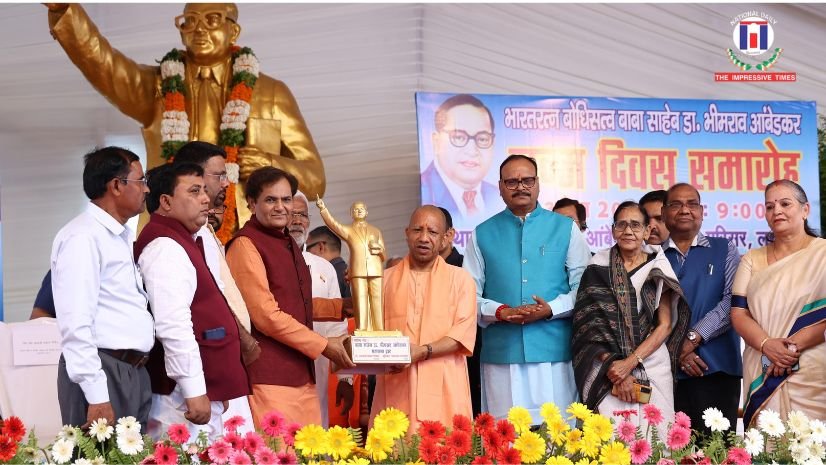
Lucknow, April 14, 2025: Over the past eight years, the Yogi Adityanath-led government in Uttar Pradesh has launched a series of initiatives aimed at the upliftment of the Dalit community, marking a significant step toward realizing the ideals of social justice. From education and self-employment to social security and dignity, the state’s focused efforts have not only ensured equal rights for Dalits but have also empowered them to move toward self-reliance.
Upholding Baba Saheb Ambedkar’s mantra of “Shikshit Bano, Sangathit Raho aur Sangharsh Karo,” the Yogi Adityanath government has taken significant steps to promote inclusive education in Uttar Pradesh. The state has established 100 Sarvodaya schools for Scheduled Caste students under the Social Welfare Department, with 60 percent of seats reserved for Scheduled Castes and 25 percent for Other Backward Classes. Currently, 2.65 lakh children are receiving free education in these institutions, along with facilities such as uniforms, books, stationery, and tablets—contributing to a notable rise in educational standards and enrollment rates.

In a further push for academic excellence, a Center of Excellence for JEE and NEET preparation has been set up at Jai Prakash Narayan Sarvodaya (Girls) School in Madihan, Mirzapur. The state government has also partnered with leading educational platforms like TCS, Khan Academy, and Embibe to provide quality and technical education.
Additionally, the government is operating an Eklavya Model Residential School aimed at delivering quality education to Scheduled Tribe students from Classes 6 to 12, with 1,440 students currently enrolled.
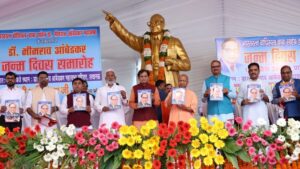
Over the past eight years, the Yogi Adityanath government has demonstrated a strong commitment to advancing education and social welfare for Scheduled Caste and Scheduled Tribe students. Under its scholarship schemes, 33.38 lakh Scheduled Caste students up to Class 10 and 88.61 lakh students beyond Class 10 have received financial assistance.
In a continued push to support Dalit education, the government has allocated Rs 968 crore for the Pre-Matric and Post-Matric Scholarship Scheme for Scheduled Caste students in the 2025–26 financial year.
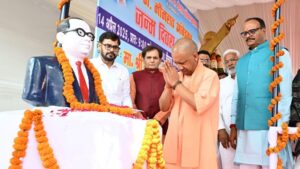
The current budget also reflects a focused approach toward the development of backward classes. A total provision of Rs 2,825 crore has been made for Pre-matric and post-matric scholarships for students from backward communities.
Additionally, Rs 200 crore has been earmarked to provide financial assistance for the marriage of daughters from economically weaker backward class families. To boost skill development and enhance employment prospects, the government has proposed Rs 35 crore for computer training programs targeting unemployed youth from backward classes—an initiative expected to open new avenues of employment across the state.
Since assuming office in 2017, the Yogi Adityanath government has made significant strides in advancing tribal welfare across Uttar Pradesh. Under the Pradhan Mantri Janjati Adivasi Nyaya Maha Abhiyan (PM-Janman), critical infrastructure and basic amenities such as education, healthcare, electricity, housing, roads, drinking water, telecommunications, and solar lighting are being provided to Particularly Vulnerable Tribal Groups (PVTGs). Notably, all 815 families of the Buksa tribe in the state have benefited from these initiatives aimed at ensuring their social security and overall development.

In a major administrative step, 42 forest villages have been converted into revenue villages and are now being developed with improved infrastructure. On the self-employment front, the Uttar Pradesh Scheduled Caste Finance and Development Corporation has facilitated self-employment opportunities for over 1.08 lakh Dalit youth. To promote entrepreneurship among them, loans worth Rs 955.49 crore—many with a 50% subsidy—have been disbursed to nearly 1.20 lakh beneficiaries, helping them move toward self-reliance.
Under the Pradhan Mantri Adarsh Gram Yojana, 93,400 development works have been completed in 1,951 Dalit-majority villages. These initiatives—ranging from the installation of solar lights and construction of toilets to provision of clean drinking water and roads—have transformed the living conditions of nearly 19 lakh residents in these areas.
The impact of the Mukhyamantri Samuhik Vivah Yojana stands as a testament to the Yogi government’s commitment to the welfare of backward, Dalit, and minority communities. Since its launch, the scheme has facilitated the marriages of over 2.20 lakh daughters from economically weaker Dalit families—making them the largest beneficiary group. Additionally, around 1.30 lakh families from backward classes and over 40,000 minority families have also benefited from the initiative.
Rooted in the ideals of Baba Saheb Ambedkar, the scheme goes beyond financial support—it is playing a crucial role in uplifting the Dalit community socially and economically, while also reinforcing their right to live with dignity and self-respect.



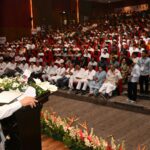

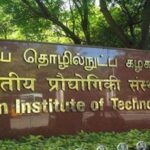


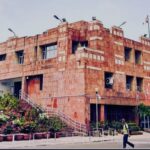



No Comments: